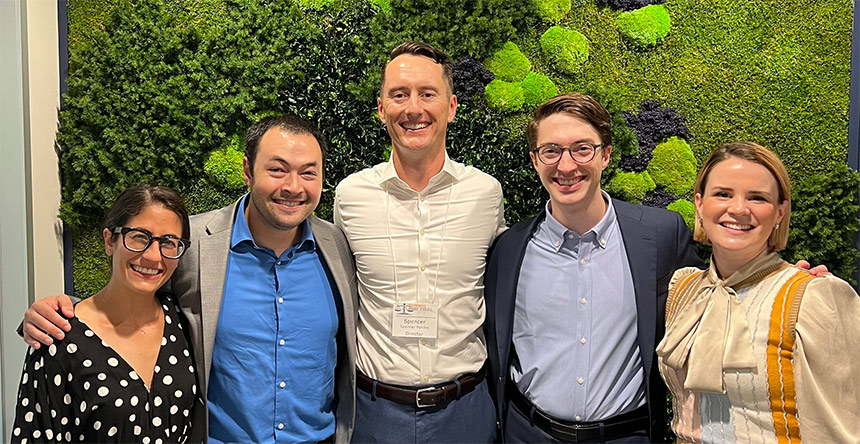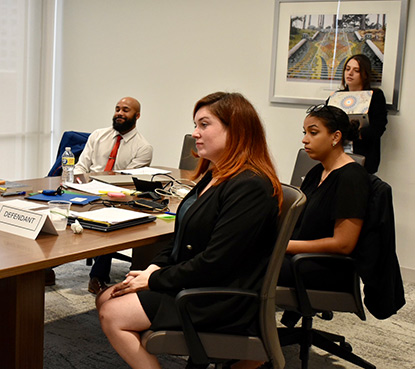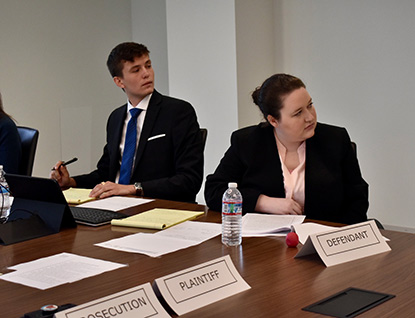
By Andrew Cohen
The joy and satisfaction, competitors freely admit, is counterintuitive. After all, flash trials are the oral advocacy equivalent of driving with no brakes, tightrope walking with no net, wasabi snarfing with no water.
Yet participants say they relished the rush at the first National Flash Trial Competition, hosted by Berkeley Law Sept. 8-11 in San Francisco. While painstaking preparation over four to eight weeks is the hallmark of most advocacy competitions, flash trials are a full-on fire drill.
Students get their 20- to 40-page case packet — with exhibits, affidavits, depositions, and special case rules — just 45 minutes before each round starts, and the trials last only one hour. Each side receives one to two witnesses who have read through the case. During their limited prep time, competitors must also work with their witnesses to plan the direct examination and figure out how to answer their opponent’s questions during cross examination.

“My head was spinning the entire weekend from how fast everything was moving,” says Drexel Law student Beatrice Schaffer, named one of three Outstanding Advocates in the preliminary rounds. “But this competition made it clear that even with minimal preparation time, you can still craft a powerful case for your client and advocate for them meaningfully. It has given me a lot more faith in my abilities to think on my feet, be confident in my arguments even when there’s no time to polish them, and avoid getting lost in the weeds of legalese.”
Eight teams of two students each were invited to the inaugural event, won by UCLA Law in a spirited final-round victory over Drexel. While as the host Berkeley Law did not field a team, its trial advocacy leaders embraced sharing the adrenaline ride with other law schools.
“Flash Trials are near and dear to our hearts and a longtime tradition at Berkeley Law,” says Spencer Pahlke ’07, the school’s Trial Team head coach. “Every year in my Trial Competition class, we do three flash trials — one per week for the final three weeks. The students are anxious about it on the front end, but always say it’s their favorite part of class when they’re done.”
Pahlke and fellow Berkeley Law alumni and Trial Team coaches Jordan Fraboni ’18, Jenna Forster ’22, Nicholas Cotter ’20, and Derin Kiykioglu ’17 co-directed the competition. They also oversaw the drafting of six case problems used in the four preliminary rounds, semifinals, and finals, coordinated a welcome dinner and awards banquet, enlisted witnesses and judges, and kept the turbo-charged event churning throughout.
Years ago, Pahlke got the idea for flash trials from a law partner who used to get “elevator cases” while working at the district attorney’s office — his supervisor would give him the file to review on the elevator heading to the courtroom. Many district attorney and public defender offices use similar drills as part of their interview process.
Seeing the payoff
Now an Alameda County public defender, Cotter recently discussed the competition on “Unscripted Direct,” a podcast for the trial advocacy community hosted by Pahlke and UCLA Law’s Justin Bernstein.
“Flash trials are challenging and anxiety-inducing,” Cotter said. “But being on the other side of it now, doing trials in a tight timeframe, I can say to Spencer, reluctantly, that I appreciate the stress he imposed upon us. It was a very useful exercise.”
The co-directors worked to ensure that each case had argument options, variety, and balance. Some rounds featured both students from a team arguing against another team’s two students in a trial with four witnesses, and others were one-on-one with two witnesses.
Case examples included a defamation claim for internet impersonation asserting harm caused by a fake Twitter account, charges for driving while intoxicated causing injury and criminal vehicular operation, and creating a private nuisance by building a “spite fence.”

“One of the students told me that he thinks he grew more as an advocate at this competition than any other he’s attended in the several years he’s competed in mock trial,” Forster says. “Hearing that is a great feeling, and it makes all the hard work worth it.”
UCLA’s winning team of Edouard Goguillon and Sarah Stebbins aimed to agree quickly on a theory for each case, which Goguillon says helped the arguments write themselves.
“The experience was beneficial for multiple reasons,” he says. “First, it forced us to quickly spot the main issues at play and analyze as best we can. Second, it gave us the chance to really test how good we are on our feet. Sarah and I didn’t write out any examinations or speeches. We didn’t have notes with us … We had our theory in the back of our mind and a couple bullet points we knew we wanted to hit. The rest was up to us to think of on our feet.”
A new tradition in bloom
Despite the amount of work involved, Pahlke hopes Berkeley Law will be the competition’s annual host and that new schools take part in the event each year.
“It’s a rush whether you’re trying a mock case or a real case,” he says. “You kind of feel like you’re flying. Add in the extremely condensed prep period with flash trials, and it feels impossible. As they’re reading the problem, students feel like it can’t be done. Then 45 minutes is up and you’re actually doing it, it’s coherent, you’re trying the case and learning the case as you go along. That adrenaline from prepping and trying it immediately is something else.”
No argument from Schaffer.
“I truly believe flash trials are a once-in-a-lifetime opportunity for law students,” she says. “The practice of distilling your client’s case down to its barest essentials under an extreme time constraint is something you don’t often face in mock trial, but it’s something that happens frequently in the legal field.”
Beyond the practical benefits of the trials by fire, Schaffer also welcomed how the social events let students get to know their fellow competitors in a relaxed, non-adversarial environment.
“It was a lot of fun getting to mingle with other schools, joke about the rounds, and learn more about people’s journey to law school and choosing trial advocacy particularly,” she says. “I made a lot of strong connections over the weekend, both professionally and personally.”